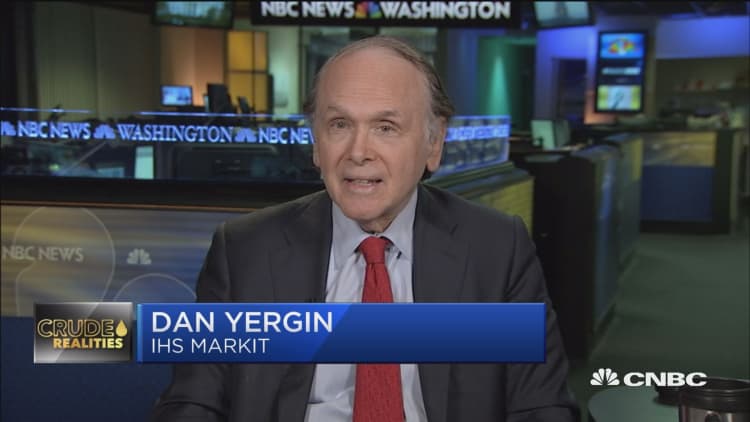Oil prices dipped on Tuesday, weighed down by uncertainty over the U.S.-China trade war and signs of increased global crude production, but losses were limited by expectations that crude exporters would agree to cut output at an upcoming OPEC meeting.
U.S. West Texas Intermediate crude ended Tuesday's session down 7 cents at $51.61. In the previous session, WTI fell to $50.10, its lowest level since mid-October 2017.
Brent crude oil fell 27 cents at $60.21, hovering above a 13-month low of $58.41 reached on Friday.
Oil prices have lost almost a third of their value since early October, weighed down by an emerging supply overhang and widespread financial market weakness. Prices rallied sharply on Monday, with Brent rising almost 2.9 percent, but the market has struggled to stay positive.

"The energy complex is making a half-hearted attempt to extend gains," said Stephen Brennock, analyst at London brokerage PVM Oil. "However, upside potential is being capped by two upcoming risk events, namely the G20 summit and next weeks OPEC meeting."
"A wait-and-see approach is therefore likely to prevail, which in turn will act as a damper on any looming price swings."
Leaders of the Group of 20 nations (G20), the world's biggest economies, meet on Nov. 30 and Dec. 1, with the trade war between Washington and Beijing top of the agenda. With the top three crude producers — Russia, the United States and Saudi Arabia — all present, oil policy is expected to be discussed.
OPEC meets in Vienna on Dec. 6 to discuss output policy together with some non-OPEC producers, including Russia.
Saudi Arabia raised oil production to an all-time high in November, an industry source told Reuters on Monday, pumping 11.1 million to 11.3 million barrels per day (bpd). Saudi Arabia indicated last month it would pump 11 million bpd in November.
But the kingdom has been pushing for a collective production cut by members of OPEC, indicating it may reduce supply by 500,000 bpd.

Norbert Ruecker, head of commodity research at Swiss bank Julius Baer, said oil had buckled after "a surprisingly swift and pronounced change in the market mood from shortage fears to glut concerns" while the world economy was also slowing down.
U.S. President Donald Trump has put pressure on Saudi Arabia, OPEC's de-facto leader, not to cut production, but most analysts expect OPEC to start withholding some supply soon.
"We suspect that producers will start to withhold exports in the coming months, putting a floor under prices," said Capital Economics.
Fereidun Fesharaki, chairman of energy consultancy FGE, said a failure by OPEC and Russia to cut supply significantly would mean crude prices would "fall further, perhaps (with) Brent at $50 per barrel and WTI of $40 per barrel or less."
— CNBC's Tom DiChristopher contributed to this report.


